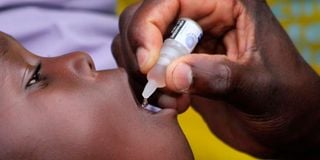Government explains what caused death of two children after receiving polio vaccine

A health officer administers polio vaccines to a five-year-old child in Nairobi.
What you need to know:
- A second round of polio immunisation is due to start this Saturday, but there are nationwide concerns about the safety of the vaccinations.
Something went terribly wrong in the polio vaccination campaign between October 2 and 6, resulting in the deaths of two children.
As 3.6 million children received the critical vaccine in different districts, 23 developed complications -- two of them died.
A second round of polio immunisation is due to start this Saturday, but there are nationwide concerns about the safety of the vaccinations.
On Friday, a committee investigating the complications released a report that largely played down the vaccine's impact on children, saying that the majority of reactions were merely coincidental and "likely due to underlying factors rather than the vaccine itself".
The Kenya National Vaccine Safety Advisory Committee, which met on October 23 and 24, said 16 of the 23 complications investigated were "coincidental". These cases had symptoms resulting from underlying or emerging health conditions unrelated to the polio vaccine, the team said.
"This classification was based on factors such as the timing of symptoms, pre-existing health issues, and environmental exposure to infections," they said.
As for the two deaths, the advisory committee said in its conclusion that they "require further engagement and deliberation with relevant global and national agencies".
One case was declared undetermined and it was not immediately clear whether it was one of the deaths.
On October 10, the Ministry of Health said it had received unconfirmed reports of adverse events related to the nationwide polio immunisation campaign from October 2 and 6 in Busia, Bungoma, Trans Nzoia, West Pokot, Turkana and selected sub-counties of Kiambu, Machakos, Kajiado and Nairobi.
“Investigations are ongoing. We discourage members of the public from spreading rumours and misinformation until MoH issues official information on this matter,” the Health ministry had cautioned at the time of the incident.
On Friday, the ministry released a statement based on the report by the Kenya National Vaccines Safety Advisory Committee, with Health Director-General Patrick Amoth seeking to play down fears of bad vaccines.
“It is important to note that more than 3.6 million children were reached and vaccinated during this campaign who are all healthy, a pointer that vaccines are generally safe,” Dr Amoth said in a statement posted on the ministry’s X account.
The 16 cases, which were not classified as serious, showed symptoms such as generalised itchy rash, fever, conjunctivitis, body rashes, abdominal pain and diarrhoea.
However, seven cases were classified as severe. They had symptoms such as fever, lower limb weakness, convulsions, diarrhoea, vomiting and herpes zoster.
“One case was classified as indeterminate due to insufficient information to determine causality while four cases were identified as vaccine product-related, showing symptoms typically associated with vaccine reactions, including generalised rash and fever,” the report said, adding that the highest number of incidents were reported in Bungoma County.
Based on this breakdown, the experts concluded that most of the cases were coincidental.
Two weeks ago, some parents told the Nation that their children had developed adverse reactions after receiving the vaccine.
“My two babies developed a cough, fever and oral thrush after receiving the polio vaccine. I have been dealing with those three issues up to today. I might not quantitatively link the vaccines they received to these ailments, but my babies became unwell after they were vaccinated,” said a father in Nairobi.
“I wonder if the Health ministry was aware of these side effects. It’s good practice to prepare parents for any adverse reactions,” another parent said.
A third parent wanted to know why the management of his two children's school had allowed the government to vaccinate his children without his knowledge or consent.
“That polio vaccine has really caused me sleepless nights. I have two kids who after getting the vaccine developed weird stomach upset issues and nausea. I was shocked to learn that they were given that oral vaccine at school even without informing us,” he complained, then wondered if this was a normal side effect.
Responding to the findings of the advisory committee on Friday, Public Health and Professional Standards Principal Secretary Mary Muthoni noted that out of 3.6 million children vaccinated, 11 boys and 12 girls aged 5-88 months and in five out of seven counties had adverse reactions to the vaccine.
“In the first phase of the campaign we managed to immunise 3.6 million children out of the targeted 3.8 million with only 23 cases of adverse reactions to the jab being reported to officials post vaccination. Investigators have now established for a fact that the two unfortunate deaths we recorded were totally unrelated to the vaccine and were as a result of underlying health complications,” she told Nation.Africa, reiterating that the polio vaccine, like any other vaccine or drug, can cause a reaction.
“Adverse reactions are very normal in the world over. We always expect and prepare for them adequately and so, there should never be a reason for not presenting your children to be immunised,” Ms Muthoni told parents.
The PS also noted that vaccine-preventable diseases remain a major challenge in Kenya, with thousands of children still dying from pneumonia and diarrhoea, which are highly preventable through immunisation.
Dr Amoth also urged Kenyans not to be afraid of vaccines.
“We continue to urge all parents and caregivers to bring their children during vaccination campaigns so that we can eradicate this debilitating disease. We reiterate that there is no harm of a child getting a repeat dose of the polio vaccine during the national vaccination campaigns,” he stated.
Dr Amoth noted that a second round of polio vaccination is planned for November 9 to 13.
According to Emmah Wamathai, a pharmaceutical technologist based in Kiambu, polio is a dreaded disease because it causes paralysis.
“About 90 percent of the infections may not cause any symptoms of paralysis, only about 10 percent will show the symptoms of paralysis. The polio virus first invades the cells of the pharyngeal and intestinal mucosa,” she told Nation.Africa.
However, in a small percentage of patients, the virus can find a way through the lymphatic system into the bloodstream and then into the central nervous system (CNS), where it causes degenerative changes that lead to paralysis.
“Dear parents and guardians, there’s no cause for alarm. Please take your children for immunisation because in practice, the oral polio vaccine is very safe and lifesaving despite the adverse reactions which are very much anticipated and can be handled by doctors,” Ms Wamathai urged.
If a parent notices any extreme reactions, the advisory committee urges them to report them to their nearest health facility or by calling *271#.





